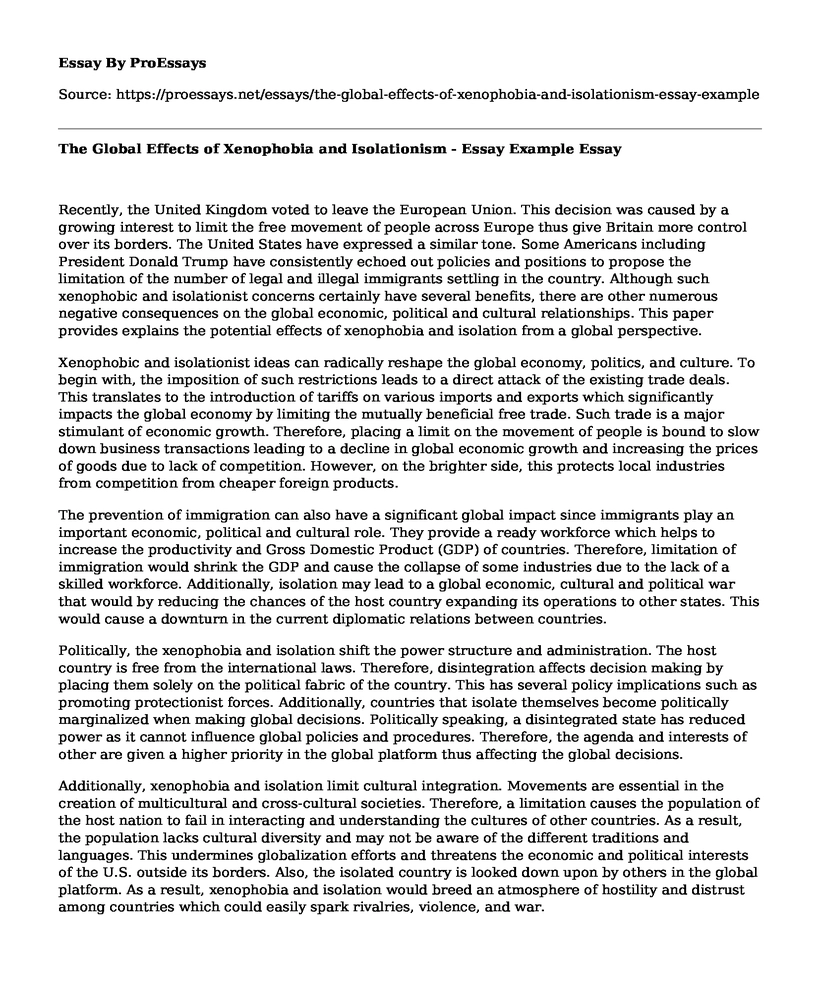Recently, the United Kingdom voted to leave the European Union. This decision was caused by a growing interest to limit the free movement of people across Europe thus give Britain more control over its borders. The United States have expressed a similar tone. Some Americans including President Donald Trump have consistently echoed out policies and positions to propose the limitation of the number of legal and illegal immigrants settling in the country. Although such xenophobic and isolationist concerns certainly have several benefits, there are other numerous negative consequences on the global economic, political and cultural relationships. This paper provides explains the potential effects of xenophobia and isolation from a global perspective.
Xenophobic and isolationist ideas can radically reshape the global economy, politics, and culture. To begin with, the imposition of such restrictions leads to a direct attack of the existing trade deals. This translates to the introduction of tariffs on various imports and exports which significantly impacts the global economy by limiting the mutually beneficial free trade. Such trade is a major stimulant of economic growth. Therefore, placing a limit on the movement of people is bound to slow down business transactions leading to a decline in global economic growth and increasing the prices of goods due to lack of competition. However, on the brighter side, this protects local industries from competition from cheaper foreign products.
The prevention of immigration can also have a significant global impact since immigrants play an important economic, political and cultural role. They provide a ready workforce which helps to increase the productivity and Gross Domestic Product (GDP) of countries. Therefore, limitation of immigration would shrink the GDP and cause the collapse of some industries due to the lack of a skilled workforce. Additionally, isolation may lead to a global economic, cultural and political war that would by reducing the chances of the host country expanding its operations to other states. This would cause a downturn in the current diplomatic relations between countries.
Politically, the xenophobia and isolation shift the power structure and administration. The host country is free from the international laws. Therefore, disintegration affects decision making by placing them solely on the political fabric of the country. This has several policy implications such as promoting protectionist forces. Additionally, countries that isolate themselves become politically marginalized when making global decisions. Politically speaking, a disintegrated state has reduced power as it cannot influence global policies and procedures. Therefore, the agenda and interests of other are given a higher priority in the global platform thus affecting the global decisions.
Additionally, xenophobia and isolation limit cultural integration. Movements are essential in the creation of multicultural and cross-cultural societies. Therefore, a limitation causes the population of the host nation to fail in interacting and understanding the cultures of other countries. As a result, the population lacks cultural diversity and may not be aware of the different traditions and languages. This undermines globalization efforts and threatens the economic and political interests of the U.S. outside its borders. Also, the isolated country is looked down upon by others in the global platform. As a result, xenophobia and isolation would breed an atmosphere of hostility and distrust among countries which could easily spark rivalries, violence, and war.
In conclusion, xenophobia and isolation have several economic, political and cultural impacts in the world. It prevents free movement of people blocking trade thus slowing down economic growth. It also creates a closed community with no new ideologies and innovations. Xenophobia and isolation also lead to political shift which alters the existing power structures and global decision making. Finally, they prevent integration and limit cultural diversity undermining globalization efforts. This creates an atmosphere of antagonism between different countries which could easily spark rivalries, violence, and war to undermine global peace.
Cite this page
The Global Effects of Xenophobia and Isolationism - Essay Example. (2021, Mar 31). Retrieved from https://proessays.net/essays/the-global-effects-of-xenophobia-and-isolationism-essay-example
If you are the original author of this essay and no longer wish to have it published on the ProEssays website, please click below to request its removal:
- Movements by Native Americans Essay
- Education Policy Brief Essay
- Government Corruption Essay Example
- Essay Sample on Reforms Needed in the Policing Institution
- Research Paper on Trump's Shithole Remark Sparks Global Outrage
- Essay Example on Our Blindness: Failing to See the Signs of Our Times
- John Locke: Natural Rights & Equality, Shaping Government Systems - Essay Sample







